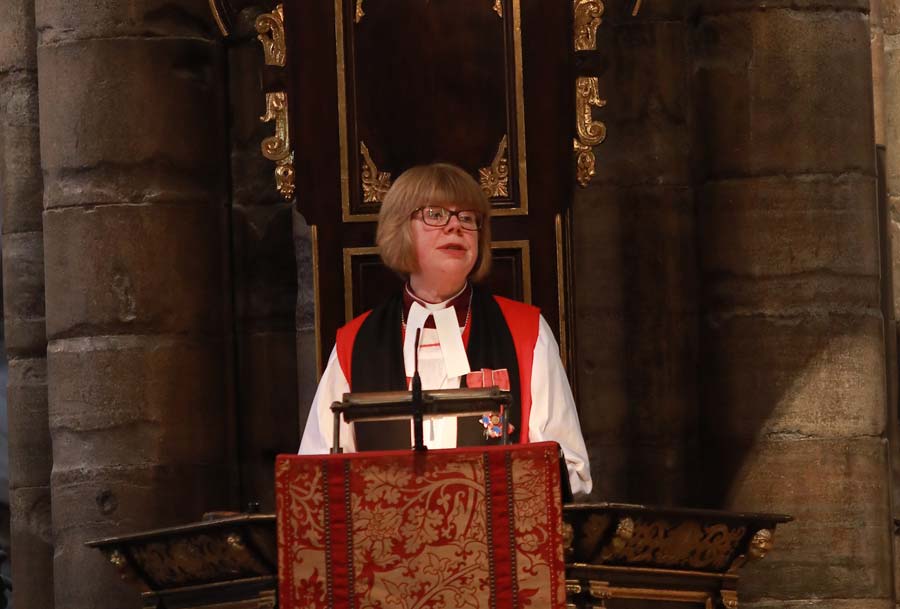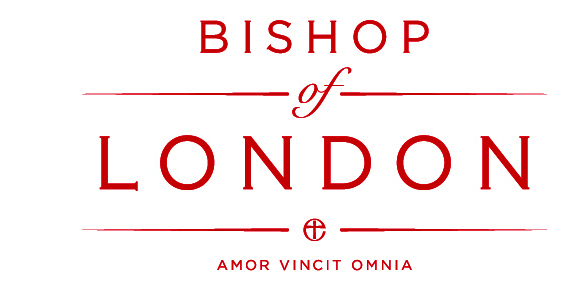
Bishop Sarah marks start of legal year in sermon at Westminster Abbey
The Bishop of London, the Rt Revd and Rt Hon Dame Sarah Mullally DBE, preached at Westminster Abbey yesterday to mark the beginning of the legal year.
The service was conducted by the Dean of Westminster, the Very Reverend Dr John Hall, and the Lord Chancellor read 1 Kings 3: 16-28, and the Lord Chief Justice read St Luke 18: 1-8.
The service was sung by the Choir of Westminster Abbey conducted by James O’Donnell, Organist and Master of the Choristers. The organ was played by Peter Holder, Sub-Organist.
Read Bishop Sarah’s sermon below:
Sermon preached by the Rt Rev and Rt Hon Dame Sarah Mullally DBE, Bishop of London
Westminster Abbey Legal Service, 1 October 2019
I am delighted to be with you today and it gives me the opportunity to thank you for all you do to ensure the rule of law. Do be assured of my prayers.
We gather at a time when what it means to bring justice to a nation is being severely tested; Some say delivering Brexit is about giving the people what they wanted. Others argue the opposite because the people didn’t know what the implications really were. Whatever our personal views there is another question “How to deliver Brexit justly?”. We have heard the different voices – Shutting Parliament to prevent debate on the one hand and Forcing the Prime Minister to listen to Parliament on the other. Whatever happens it seems that many will cry out that justice hasn’t been done.
In our present political climate, you may believe that justice is simply the about the interpretation in law of the actions of others and their consequences.
In an environment of rising violent crime among the young if you were to listen to some of our newspapers and television programs you could believe that “justice “simply means catching criminals, sending them through the court system with due process, granting people legal representation and a jury of their peers.
When Amos declared, “Let justice roll down like a mighty stream,” he did not mean, “Let police forces expand, let prisons proliferate, and let criminals get their just deserts.”
Justice in the Bible has less to do with the conviction of the guilty and more to do with the care of the innocent. C.S. Lewis once noted that we have an entire biblical book titled “Judges,” and yet not one of those judges like Deborah, Barak, or Samson ever put on a robe and presided over court cases argued by lawyers. No, judges in ancient Israel were champions for the oppressed, heroes who sallied forth into society to end oppression of the poor and who tried to vindicate God’s way of doing things.
In fact, a key clue as to what justice meant in the Old Testament can be found in a verbal triplet that pops up regularly whenever God or the prophets are talking about what constitutes a just society in Israel. Over and again God expresses his divine concern for “widows, orphans, and aliens.” Women who had lost husbands, children who had lost parents and foreigners who were not native Israelites: what did each of these three groups have in common? Each was vulnerable. Each had no reliable means of income. Each had at least the potential to be socially invisible and so marginalized and often lived life in the light of injustice.
Solomon was an example of someone equipped by God to administer justice wisely and well. We see this in 1 Kings 3:28 “they held the king in awe, because they saw that he had wisdom from God to administer justice.” We may baulk at that idea in our present climate!
The rule of law in this country has arisen out of this Biblical tradition. The concern of law with justice is one rooted in the concern of God. Law holds the powerful to account and protects the vulnerable.
Leviticus reads: When you reap the harvest of your land, you shall not reap to the very edges of your field or gather the gleanings of your harvest. 10 You shall not strip your vineyard bare, or gather the fallen grapes of your vineyard; you shall leave them for the poor and the alien:
That is a very helpful touchstone for the rule of law which is God’s business as well as ours. The naked clothed, the hungry fed, and the thirsty given a drink. Jesus tells us it is mercy that is required of us not sacrifice.
We live in a part of the world that has a rich history of working towards democracy and the kind of vision for justice that I have been describing. Whether we go back to the Magna Carta or think forward to 1918 Representation of the People Act – we are privileged to live in a country that seeks to ensure justice at every level. Interestingly “the 61st clause of the Magna Carta, known as the Security Clause, declared that a council of 25 barons be created with the power to overrule the will of the King, by force if necessary. This was repealed angrily by the King shortly afterwards!
So … It is right that we seek to put our best legal minds to discerning what represents justice and democracy in our day. It is right that when there is dispute, we work hard to discern what is best. But what we must not forget is that justice starts with the poor, the marginalised, the weak and the oppressed. It is those who are most vulnerable who desperately need the system to work for them. We must ask: Are all our political and legal wranglings aimed at bringing justice to them?
But sometimes human leaders get it wrong. The wisdom of Solomon in our reading gives way later to Solomon’s folly where he has 700 wives, 300 concubines and sacrifices to false Gods.
Likewise, for all the high points in British democracy there are low points too. Arguably our present situation being one of them – filled with chaos and confusion – it is one in which wisdom is required. For wisdom, we are told in proverbs is more precious than rubies, better than fine gold and surpasses silver. It is wisdom that will give us a garland to grace our heads and present us with a glorious crown and an adornment around the neck.
Wisdom for Solomon had to do with the good of others and not to the advantage of self, it was about inward worth and not outward show.
Solomon asked for wisdom not to be admired but so he could rule well for the good of the people and equitably.
Solomon sought the peace and prosperity of the people; he did not ask for riches and honor but for wisdom.
When King Solomon was offered anything in the whole world he asked for wisdom and God was so delighted He gave him wisdom and everything else as well.
As a Christian I continue to see hope when we are faced with situations that seem profoundly unjust and out of control. For my hope is not merely in the wisdom of fallible human leaders but in a God, who has promised to “see that [his people] get justice” and I have hope in people who let justice roll down like a might stream.
God doesn’t promise to operate like Alexa (on a good day!) and respond instantly to our requests. But it is a promise that he will be at work to put right what is wrong in his own time and in his own way.
Justice calls us to persist in prayer for God’s unseen hand to overrule and direct the proceedings of our day.
Let us pray that we may act justly, love mercy, and walk humbly with our God. Let us pray for wisdom.
To watch Bishop Sarah’s sermon click here.
